You are currently browsing the daily archive for June 23, 2010.
THE NATIVITY OF SAINT JOHN THE FORERUNNER AND BAPTIZER OF THE LORD

Six months before his appearance in Nazareth to the All-holy Virgin Mary, the great archangel of God, Gabriel appeared to Zacharias the high priest in the Temple at Jerusalem. Before he announced the miraculous conception to the unwed virgin [Mary], the archangel announced the miraculous conception to the childless old woman [Elizabeth]. Zacharias did not immediately believe the words of the herald of God and this is why his tongue was tied with dumbness and remained as such until eight days after the birth of John. On that day, the relatives of Zacharias and Elizabeth gathered for the young child’s circumcision and for the sake of giving him a name. When they asked the father what name he wishes to give to his son and being dumb, he wrote on a tablet: “John.” At that moment his tongue became loosed and he began to speak. The home of Zacharias was on the heights between Bethlehem and Hebron. The news of the appearance of the angel of God to Zacharias was spread throughout all of Israel, as well as of his dumbness and the loosening of his tongue at thee moment when he wrote the name “John.” The news concerning this even reached Herod. Therefore, when Herod sent soldiers to slay the children throughout Bethlehem, he directed men to the hilly dwelling place of the family of Zacharias to kill John also. However, Elizabeth promptly hid the child. Enraged, at this King Herod sent his executioners to Zacharias in the Temple to slay him (for it happened that it was Zacharias’ turn again to serve in the Temple of Jerusalem). Zacharias was slain between the court and the temple and his blood coagulated and petrified on the stone pavers and remained a perpetual witness against Herod. Elizabeth hid with the child in a cave where she died soon after. The young child John remained in the wilderness alone under the care of God and God’s angels.
HYMN OF PRAISE to SAINT JOHN THE BAPTIST
By God’s miracle, John entered the world,
As once did Sarah’s and Abraham’s Isaac,
By God’s miracle, remained alive
From Herod’s bloody knife.
The knife, the young child John missed,
But John’s father, it did not miss;
By God’s miracle, John in the desert
For thirty years, he sustained himself,
To the servant of God angels are shepherds
To the poor angels are guardians!
John grew loveable lamb,
The Lamb of God to serve,
To proclaim the bright day, before the sun,
The Unknown, recognized and glorified.
Of the great prophets, the last
And of God’s apostles, the beginning.
As Elijah, with God he speaks
And as an apostle, loves and rebukes,
Of the high priest, wondrous son,
Of the martyr of God, the first-born brother.
(written by St Nikolaj Velimirovic in “Proolog from Ohrid”)
See Also: The Church of the Nativity of St. John

Theology is the word of God, which is apprehended by pure, humble and spiritually regenerated souls, and not the beautiful words of the mind, which are crafted with literary art and expressed by the legal or worldly spirit.
Just as a beautiful statue cannot talk, manufactured words are unable to speak to the soul of a man, except if the listeners are very worldly, and pleased simply by charming conversation.
Theology that is taught like a science usually examines things historically and, consequently, things are understood externally. Since patristic ascesis and inner experience are absent, this kind of theology is full of uncertainty and questions. For, with the mind one cannot grasp the Divine Energies if he does not first practice ascesis and live the Divine Energies, that the Grace of God might be energized within him.
Whoever thinks that he can come to know the mysteries of God through external scientific theory, resembles the fool who wants to see Paradise with a telescope.
Those who struggle patristically become empirical theologians through the visitation of the Grace of the Holy Spirit. All those who have an external education, in addition to the internal enlightenment of the soul, may describe the divine mysteries and interpret them correctly, as did many Holy Fathers.
If, however, one does not become spiritually related to the Holy Fathers and wants to take up translating or writing, he will wrong both the Holy Fathers and himself, as well as the people, with his spiritual cloudiness.
Neither is it right for someone to theologize using someone else’s theology, because he will resemble an impotent man who adopts others’ children, presents them as his own and pretends to be the father of a large family. The Holy Fathers took the divine word or personal experiences from their hearts; they were the result of spiritual battles against evil and the fire of temptations, which they confessed humbly or, out of love, wrote down in order to help us. They never kept this love for themselves, acknowledging, likewise, that humility and all the divine gifts are of God.
Those who present the gifts of God as their own are the most insolent and most unjust of the world, for they wrong God and, even more, their own selves. In this way they cause themselves to be deprived of Divine Grace so that they won’t be judged as being more ungrateful and so they won’t be destroyed due to their great vainglory.
Those who are grateful towards God for everything and constantly attend to themselves humbly and look after God’s creatures and creation with kindness, theologize and thus become the most faithful theologians, even if illiterate. They are like the illiterate shepherds who observe the weather in the countryside, day and night, and become good meteorologists.
Those who live simply, with kindness and good thoughts, and have acquired inner simplicity and purity, regard the supernatural very simply, as natural, for everything is simple to God. He does not use greater power for the supernatural and less for the natural, but the same power for everything. He Himself is very simple and His Son revealed it to us on earth with His holy simplicity.
When purity comes to man and simplicity with its fervent faith and devotion arrives as well, then the Holy Trinity takes up His abode within us. With this divine enlightenment one easily finds the keys to divine meanings, so as to interpret the Spirit of God in a very simple and natural way, without causing an intellectual headache.
Depending on the purity or guile that one possesses, analogous interpretations are made, and one is benefited or harmed accordingly. Oftentimes, one may cause harm due to his inexperience, even if acting with good intentions. For example, a person does not know that white wine also exists apart from red, and pours red paint into it to seemingly make it better, and, in this way, poisons people. But even if he is not inexperienced or deceitful, but works only from human justice and logic, he will once again wrong the Spirit of God, and, as a result, harm himself and others.
With human logic and justice we also hear the complaints of the labourers of the first and third hour in the Gospel60, who believed that they were unjustly treated. God, however, the beholder of the hearts of men, with the subtlety of His divine justice, also rewarded the labourers of the eleventh hour for the anguish they suffered before finding work. God would have even given to the labourers of the eleventh hour a greater reward, out of His divine righteousness, full of mercy and love, because the poor ones suffered greatly in soul and were more fatigued than those, who, for more hours, were exhausted physically. But we, wretched people that we are, cannot fit God’s divine justice into our limited mind, just as His infinite kindness cannot fit inside our limited love. Therefore, God’s love was limited to giving everyone the same agreed reward, so as not to scandalize more those who loved their self more than their fellowmen. If He told them: “I am not doing you wrong; we agreed on this amount…”. He meant that: “I am a boss with noble love and divine justice which you cannot understand” and not: “I am boss and 1 take no one into consideration”. For God is our Father and we are His children, and all people know of His fatherly love; He was crucified in order to redeem and restore us to Paradise.
If we could go out of our self (the love for our self), we would also escape from the gravity of the earth and see everything in reality, with a divine eye, clearly and profoundly. That is why it is necessary for one to leave the world for the desert, struggle with humility, repentance and prayer, be deserted by his passions, remove his spiritual “rusts” and turn into a good conductor in order to receive the Divine Grace and become a true theologian.
If we don’t remove the rust from our spiritual cables, we will constantly be short circuited, full of worldly theories, doubts and questions. Then we cease theologize, being found in a condition of worldliness, but will speak historically, or examine things legally and mathematically. Namely, we will examine how many nails were used to crucify Christ and how many soldiers were present when He was crucified without proceeding to the essence of things: that Christ was crucified for our own sins, in order to redeem us, and suffered more than all of the Holy Martyrs put together. Although He helped the Martyrs with His divine power, He did not employ His divine power for Himself at all and suffered terrible pains out of love, having both of His two hands and His two legs pierced with nails. Whether they crucified His two legs with one or two nails has no importance, inasmuch as both were nailed and He suffered the pain and drank the vinegar, that He might sweeten us again in Paradise, eternally close to Him, as our Loving Father.
(Taken from the Epistles of Elder Paisios)


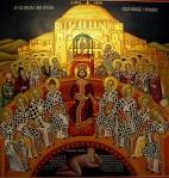 Christian Dogma
Christian Dogma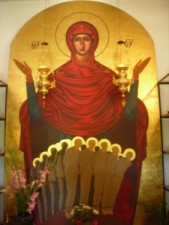 Christian Martyrs
Christian Martyrs Christian Orthodox Churches and Monasteries
Christian Orthodox Churches and Monasteries Christian Sermons and News
Christian Sermons and News Church's Teachings on Fasting
Church's Teachings on Fasting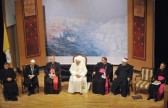 Ecumenism – a Great Heresy
Ecumenism – a Great Heresy Father George Calciu
Father George Calciu Life_a Sacred Gift form God
Life_a Sacred Gift form God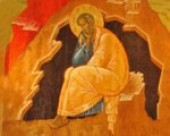 Orthodox Saints and Church Fathers
Orthodox Saints and Church Fathers Spiritual Elders
Spiritual Elders Daily Bible Readings
Daily Bible Readings Journey to Orthodoxy
Journey to Orthodoxy Listen to Ancient Faith Radio
Listen to Ancient Faith Radio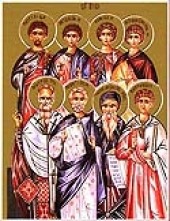 Orthodox Calendar of Feasts and Saints
Orthodox Calendar of Feasts and Saints Orthodox Christian Mission Center
Orthodox Christian Mission Center Orthodox Institute
Orthodox Institute OrthodoxChristianNetwork TV
OrthodoxChristianNetwork TV
Recent Comments